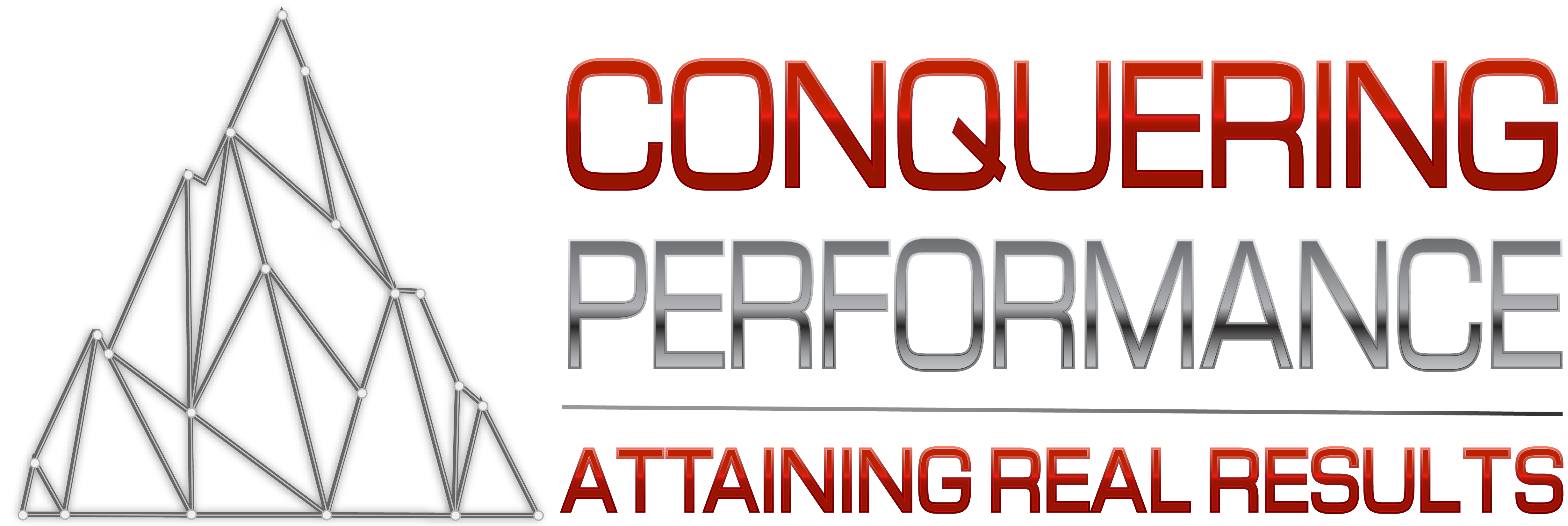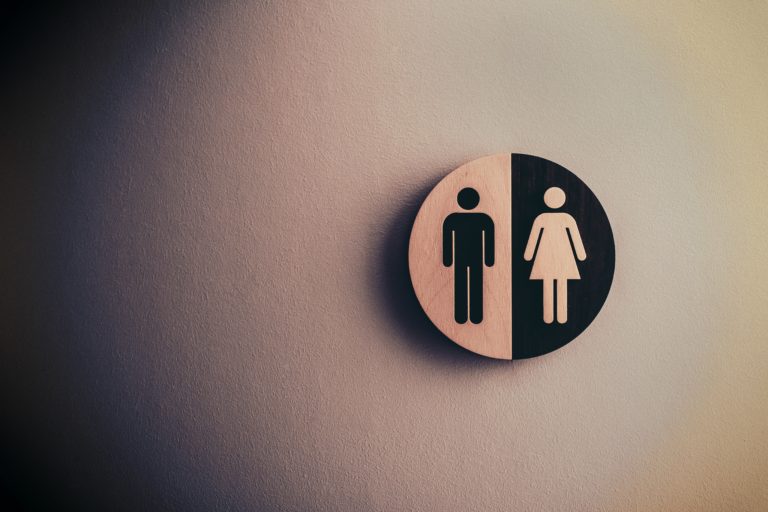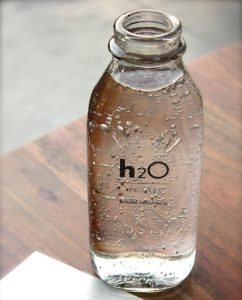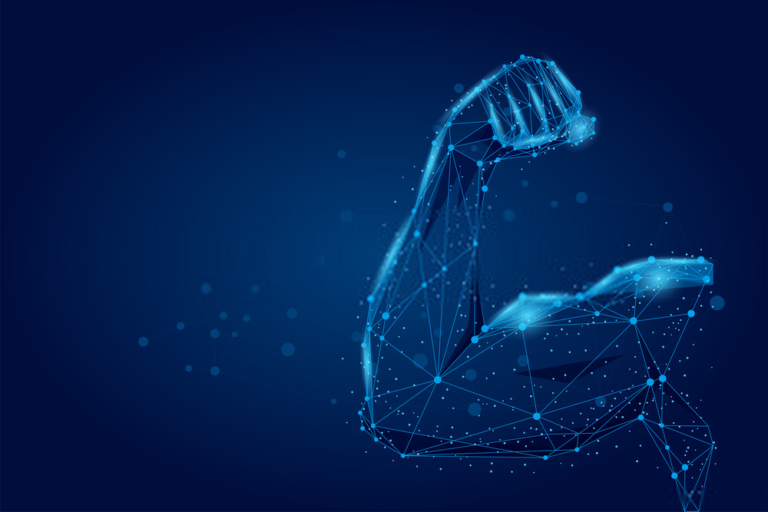WHY YOU NEED TO CONQUER YOUR SLEEP
START YOUR JOURNEY TO BETTER PERFORMANCE NOW
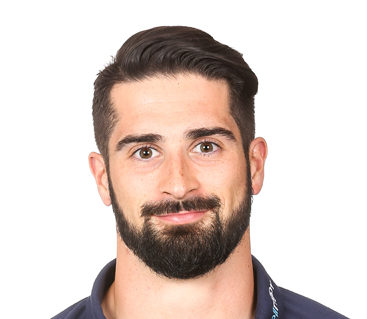
By GARETH LYNCH
How much would you pay for a new and revolutionary new supplement that will improve your; learning abilities, creativity, motor skills, time to exhaustion, aerobic output, aerobic output, sprint times, fine motor skills and reduce injuries rates. It will also help you keep slim and lower your food cravings. It increases your immune system and will help lower your risk of heart attack and diabetes. It will even make you feel happier, less depressed and less anxious.
Sounds like a serious supplement doesn’t it! I would hazard a guess that a lot of people would be happy to pay a large sum of money to buy this supplement and the benefits it would provide. The good news is you don’t have to pay anything. All you need to do is get a full night’s sleep. Sounds too simple to be true, right? But, don’t be caught in the paradigm that something simple can’t be as good as the expensive, shiny, flashy new things.
If you have read “Robert Cialdini’s “Influence”, you might recall the case study of the local jeweler who managed to sell out of turquoise jewelry because it was accidentally priced at double its initial price, instead of being halved. The new inflated price now made the jewelry irresistible to buyers, who had previously ignored it. Now that the price had been raised, the context of turquoise jewelry had a “high value” in the buyers’ minds, even without an explanation.
Don’t be misguided about the importance of sleep to your performance. Keep reading to see why sleep should have a high value in your life.
“Sleep is the most important thing when it comes to recovery.” – LeBron James
Sleep is an essential part of your recovery process as it provides a number of important psychological and physiological functions. During sleep the brain enriches a diversity of functions, including your ability to learn, memorize, make logical decisions and choices.
Throughout your body, sleep:
Assists in the restocking your immune system,
Reforms your body’s metabolic system by fine-tuning the balance of insulin and circulating glucose,
Helps control your appetite which helps control body weight through healthy food selection rather that rash impulse.
Aids in the maintenance gut microbiome. (1,2,3)
Your daily performance is highly dependent on one of the main biological rhythms, the sleep–wake rhythm. This rhythm is driven by your internal living clock, also known as your circadian rhythm. It sets your sleep and wake patterns so you can be awake and in good shape to exercise and perform during the day, and sleep and recover during the night.
It is possible to reinforce the synchronisation of your circadian rhythm, with activities like; physical exercise, exposing yourself to light and social cues. These are considered as a zeitgeber (Time Giver), which will be important later when we cover jet-lag and strategies around overcoming it.
Performance has been shown to be dependent upon both the quality and the quantity of sleep with only a few hours of sleep deprivation having a major impact.
It is beyond doubt that knowledge workers and athletes need more sleep than sedentary people. So in order to perform optimally, you need to respect the “rules” imposed by the circadian pacemaker for establishing consistent sleep periods (4).
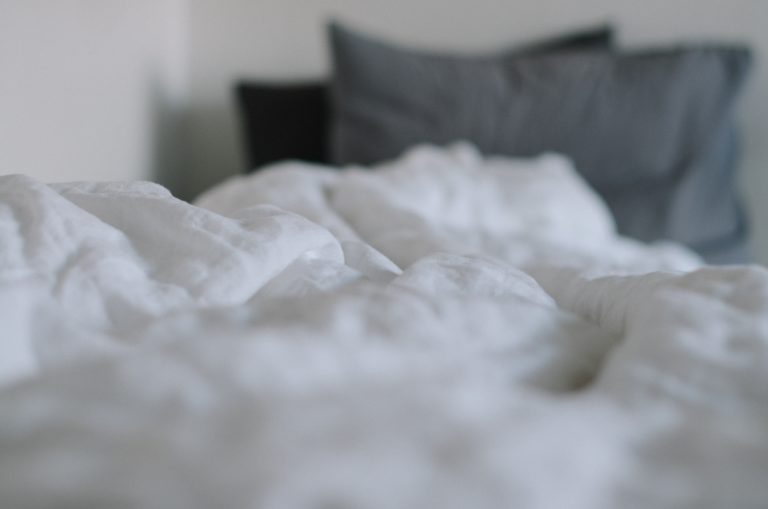
DOES SLEEP DEPRIVATION AFFECT YOUR PERFORMANCE?
Just one night of inadequate sleep quantity or quality can affect your health, cognitive and physical performance.
Physical Health
Just one night of poor sleep can have an effect on your health. A study of 27 men and women showed that a reduction of sleep to 4 hours over one night had a dramatic change on their hunger hormones and appetite. Men had a surge in the hunger hormone ghrelin. This is a hormone that tells you that you are hungry. The female participants had a reduction in GLP-1, a hormone which tells you that you are full. The effect was the same on both men and women with them eating more after a poor night’s sleep (5).
Routinely sleeping less than 6 hrs a night can impact your health by:
Reducing your immune system.
- Increasing your risk of developing insulin resistance.
Doubling your risk of developing cardiovascular problems
Increasing your desire to eat and thus gaining weight. (6,7,8,9)
Cognitive Performance
Today, prolonged wakefulness is a widespread phenomenon. In some circles this lack of sleep is seen as a badge of honor and work ethic. But you may be hindering your performance rather than getting more done because short as well as long‐term sleep deprivation has been shown to have detrimental effects on your cognitive performance.
Lack of proper sleep quality and quantity has been shown to impair simple task performance, such as your reaction time, vigilance, and attention (10,11,12,). Similarly, complex task performance is also impaired by lack of proper sleep, with tests of working memory, verbal fluency and speech articulation, language, logical reasoning, creative and flexible thinking and planning, decision making, and judgment all showing reductions if you are sleep deprived (13,14,15,16).
Physical Performance
Lack of adequate sleep has an impact on many areas of your physical performance. Your aerobic and anaerobic pathways, time to fatigue, motor skill learning and recovery processes are all detrimentally affected if you do not get adequate sleep quality and quantity.
Obtaining anything less than eight hours of sleep a night and especially less than six hours a night can affect your time to physical exhaustion with a drop of 10-30% and aerobic output is significantly reduced (17).
FORCE OUTPUT
Reilly et al., examined the effects of partial sleep deprivation on submaximal and maximal effort biceps curl, bench press, leg press, and deadlift. They also took a profile of mood states, RPE and subjective sleepiness. Their results indicate that maximal and submaximal lifting tasks and mood states are significantly affected by sleep loss (18).
AEROBIC WORK
Maximal aerobic work rate has been found to decrease (15 W) after partial sleep deprivation caused by a delayed bedtime or by an early awakening during incremental cycling to exhaustion (30 min at 75 % VO2max followed by 10 W increase every min) (19).
ANAEROBIC WORK
Average and peak power during Wingate anaerobic cycle tests have been shown to decrease in students, footballers, and judo competitors following 4 hours of sleep restriction for 1 night (20,21,22).
FINE MOTOR SKILLS
A reduction in fine motor skills performance has been shown in sleep restricted athletes from dart players, tennis players, to handball goalkeepers (23,24,25).
SPORTS SPECIFIC
A 2011 study led by Mah et al, an expert on the effects of sleep on sports performance, showed sleeps impact on game performance. Over several weeks, the nightly sleep of 11 basketball players was increased, with a goal of spending 10 hours per night in bed. At the end of the trial, 3-point accuracy improved 9.2%, faster sprint times were recorded, and free-throw accuracy increased 9%. There was also a decrease in reaction times and a decrease in subjective fatigue (26).
RECOVERY
The role of sleep in recovery is a complex issue but sleep deprivation may be detrimental to your recovery process, resulting in impaired muscle glycogen repletion, impaired muscle damage repair, alterations in cognitive function and an increase in mental fatigue.
A 2014 study by Milewski et al., examined the impact of sleep deprivation on injury rates in young athletes. They found that athletes who slept on average <8 hours per night were 1.7 times more likely to have had an injury compared with athletes who slept for ≥8 hours (27).
I hope this encourages you to get optimal amounts of sleep to help protect against athletic injuries and poor performance.
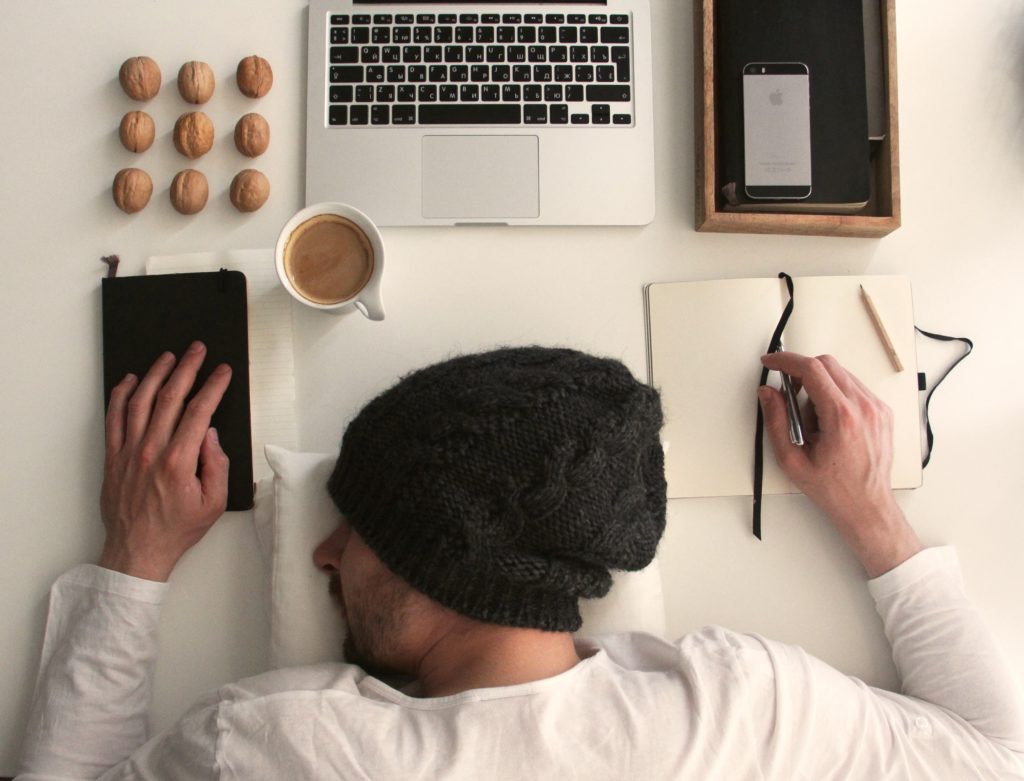
ARE YOU GETTING ENOUGH GOOD SLEEP
Good sleep health is a multidimensional rhythm of sleep and wakefulness. To define it we need to consider your social, physiological and environmental demands, that promote your physical and mental well-being. You need to look at your individualised subjective satisfaction, appropriate timing, adequate duration, high efficiency, and sustained alertness during waking hours (28).
While a clinical sleep assessment is necessary to get an accurate measure of your sleep quality you may ask yourself the questions below and see how you rate.
This is a combination of two sets of questions designed by some of the best sleep experts in the world, Matthew Walker and Dr. James Maas.
Self Sleep Assessment Questions:
Does a warm room, boring meeting, big meal or a low dose of alcohol make you sleepy?
Do you fall asleep within 5 minutes of getting into bed?
Do you need an alarm clock to wake up?
Do you hit the snooze button repeatedly?
Do you sleep extra hours on the weekend?
Can you function optimally without caffeine before 12am?
After you wake up in the morning could you fall back asleep at 10 or 11am?
Do you find yourself reading and then rereading the same sentence?
Dr. James Maas has said if you answer yes to any two of the questions then you should consider yourself sleep deprived and not getting enough sleep quality or quantity.
Another tool to assess your sleep has been developed by Dr. Daniel J. Buysse. It assesses the five key dimensions of sleep that have been consistently associated with health outcomes. The dimensions are Satisfaction with sleep; Alertness during waking hours; Timing of sleep; Sleep Efficiency; and Sleep Duration. It is known as the SATED scale, see diagram below.
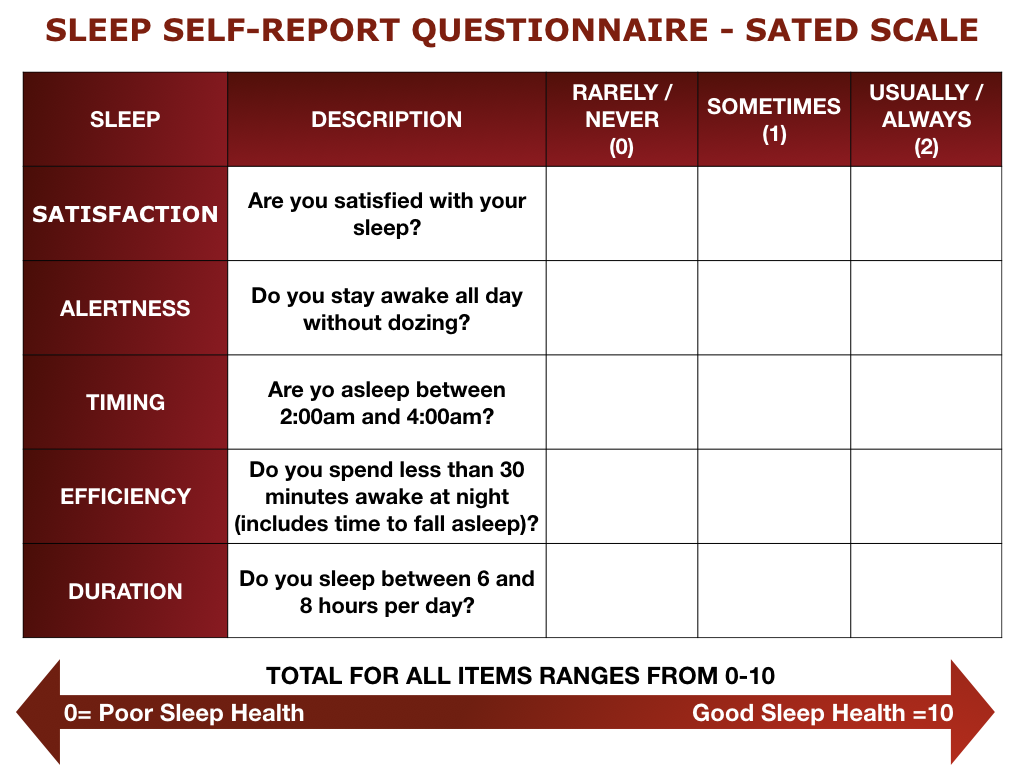
HOW MUCH SLEEP DO YOU NEED?
Eight hours a night is often quoted, but the optimum sleeping time can vary from person to person and at different times of their life. There are a number of factors that affect how much sleep you need, such as age, genetics, physical exertion levels, overall health, diet, medication. In a comprehensive review, the US National Sleep Foundation concluded that the ideal amount of sleep is seven to nine hours for adults, and eight to ten hours for teenagers.
However, a rare gene called BHLHE41 or DEC2 has recently been discovered. The individuals who possess this gene appear to need less sleep and can survive on 6 hours of sleep and show minimal impairment. However this gene is extremely rare and it is highly unlikely you possess it as only a fraction of 1% of the population have the gene.
If you find yourself needing a caffeine hit in the morning to feel awake, you probably didn’t get enough sleep. Many people are under the assumption that they are getting enough sleep. Unfortunately they’ve just adjusted to this low level of sleep, in the same way you don’t notice yourself growing. However, when performance measures are tested, large decrements can be seen. This highlights the imapred state they are actually performing at, even it they are unaware of it.
Scientist Matthew Walker says that if you want to figure out your individual sleep needs, you should spend about a week letting yourself fall asleep when you are tired and then waking up naturally, without an alarm.
It is also worth noting that during the periods of heavy training it is important to respect the greater amount of sleep required, allowing spontaneous awakening to occur and sleep to be taken in an optimal environment (quiet, dark, not too hot, comfortable). It may also be valuable to add in a daytime nap to help boost recovery (29).
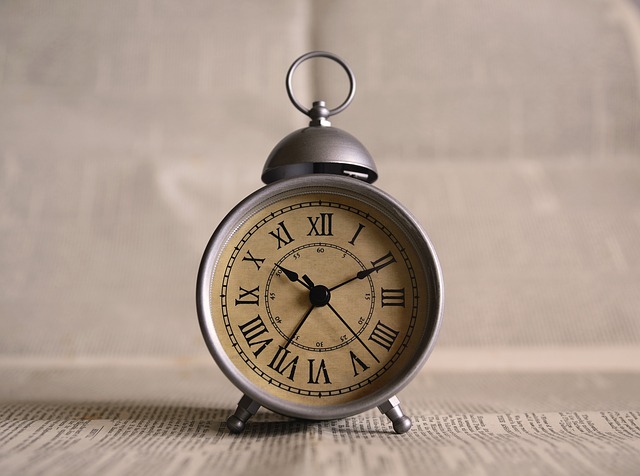
10 TACTICS TO IMPROVING YOUR SLEEP
Do you feel you aren’t getting the most from your sleep? Try these 10 tactics to insure that you get the restorative sleep that is required for tissue repair, muscle growth, recovery, mental sharpness and decision-making.
Stick to a sleep schedule – We are creatures of habit. This will allow you to set your body clock and routinely get a good night’s sleep
Exercise – At least 30mins everyday but not 2 hours before bed as this can elevate your core temperature and make getting to sleep more difficult
Avoid caffeine after 3pm – Caffeine has a half-life of 5hrs on average – this means if you have a 100mg of caffeine at 8pm you could still have 50mg in your system which can make it hard to fall asleep at night.
Avoid Alcohol before sleep – It may help you relax but it plays havoc with your REM sleep which is vital for sleep quality.
Naps – Can be great for catching up on lost sleep, but don’t nap after 3pm. Late afternoon naps can make it difficult to sleep at night.
Hot bath or shower – The drop in core body temperature as the warm blood rushes to the skin can help you fall asleep.
Dark cool bedroom – Temperatures of 22ºC or 70ºF seem to work best for night time sleeping.
Avoid Blue light – Turning off your laptop, TV and phone screens an hour before bedtime can increase your natural melatonin levels, giving you better sleep. You can also use apps like f.lux or purchase blue light blocking glasses to help reduce your exposure to the light
Relax – Leave time at the end of you day to unwind, read a book or listen to some light music or meditate.
Zinc & Magnesium – If you are lacking dietary Zinc and Magnesium supplementation might be an idea as they have been shown to improve sleep quality and quantity along with having other health benefits(30,31,32).

Jet Lag Symptoms:
Poor sleep during the new night-time, including delayed sleep onset (after eastward flights)
Early awakening (after westward flights), and fractionated sleep (after flights in either direction).
Poor performance during the new daytime at both physical and mental tasks.
Negative subjective changes. These include increased fatigue, frequency of headaches and irritability, and decreased ability to concentrate.
Gastrointestinal disturbances (indigestion, the frequency of defecation, and the consistency of the stools) and decreased interest in, and enjoyment of, meals
Since jet lag is caused mainly by inappropriate timing of the body clock in the new time zone, you can take action to help adjust. As we mentioned earlier, exposing yourself to Zeitgebers can help synchronisation of your circadian rhythm. Both pharmacological and behavioural methods can be used to alleviate the negative results of time-zone transitions.
Steps To Help With Jet Lag:
Avoid day sleep on flights – you should refrain from sleeping on flights unless it is night by destination time. Although banking sleep when you feel most tired might seem advantageous, you tend to keep your circadian rhythm anchored to your old time-zone.
Melatonin – Taking melatonin, generally 3–5 mg, taken 2–3 h before bedtime at a time when sleep would be appropriate by destination time has been shown to be useful in some studies.
Caffeine – Is a stimulant that is widely used to maintain your daytime alertness.
Exercise – Gentle exercise in bright daylight can help adjust your circadian rhythm.
Morning light – exposing yourself first thing to morning light upon waking advances your body clock.
Preparation before leaving – adjusting your sleep-wake cycle to the new time zone in the days before eastward flights, by combination of advancing sleep time (1 h per day) with bright light on rising for the 3 days before the flight can help to calibrate your body clock before arrival (33).
CONCLUSION
Sleep is a critical component of human and athletic performance.
It is an essential part of your recovery process as it provides a number of important psychological and physiological function. Sleep is the regeneration and restoration process for the mind and body. Sleep deprivation for just one night can have an effect on your physical and cognitive performance.
An association between cognitive performance and sleep habits or daytime sleepiness levels has also been shown. With a lack of adequate sleep leading to a decrease in your reaction time, attention, working memory, logical reasoning and decision making.
Physical performance has also been shown to be negatively affected during periods of sleep deprivation. It has a detrimental effect on your recovery, fine motor skills, anaerobic work capacity, aerobic work capacity and your force output.
There are techniques and practices that can be put in place to improve sleep quantity and quality that should be considered by athletes and knowledge workers to get the most out of their performance.
With all that you have just learned about the benefits of hydration, why not try our 7 day Sleep Challenge. Taking on the challenge will ensure you stay on top of your performance.
The Challenge
You need to complete all points consistently for 7 days.
Over the next 2-3 nights rate your sleep on a scale of 1-10 on how satisfied you are with your alertness during waking hours, sleep quality (how refreshed you feel) and sleep duration.
Make your new sleep routine – define your sleep schedule, avoid screens an hour before bed, no caffeine after 3pm and exercise at least 30mins every day. Feel free to add in any of the other suggestions from the ‘10 tactics to improve your sleep’ section
Stick to your sleep routine for 7-14 days consistently (even on weekends)
Rerate your sleep satisfaction and compare it to your previous scores.
Let me know how your daily performance, mood and energy levels feel after 7-14 consistent days.
REFERENCES
Davenne, D., 2009. Sleep of athletes–problems and possible solutions. Biological Rhythm Research, 40(1), pp.45-52.
Halson, S.L., 2008. Nutrition, sleep and recovery. European Journal of sport science, 8(2), pp.119-126.
Frank, M.G., 2006. The mystery of sleep function: current perspectives and future directions. Reviews in the Neurosciences, 17(4), pp.375-392.
Davenne, D., 2009. Sleep of athletes–problems and possible solutions. Biological Rhythm Research, 40(1), pp.45-52.
St-Onge, M.P., O’Keeffe, M., Roberts, A.L., RoyChoudhury, A. and Laferrère, B., 2012. Short sleep duration, glucose dysregulation and hormonal regulation of appetite in men and women. Sleep, 35(11), pp.1503-1510.
AlDabal, L. and BaHammam, A.S., 2011. Metabolic, endocrine, and immune consequences of sleep deprivation. The open respiratory medicine journal, 5, p.31.
Oztürk, L., Pelin, Z., Karadeniz, D., Kaynak, H., Çakar, L. and Gözükirmizi, E., 1999. Effects of 48 hours sleep deprivation on human immune profile. Sleep Res Online, 2(4), pp.107-111.
Meier-Ewert, H.K., Ridker, P.M., Rifai, N., Regan, M.M., Price, N.J., Dinges, D.F. and Mullington, J.M., 2004. Effect of sleep loss on C-reactive protein, an inflammatory marker of cardiovascular risk. Journal of the American College of Cardiology, 43(4), pp.678-683.
Rains, J.L. and Jain, S.K., 2011. Oxidative stress, insulin signaling, and diabetes. Free Radical Biology and Medicine, 50(5), pp.567-575.
Horne, J.A., 1988. Sleep loss and “divergent” thinking ability. Sleep, 11(6), pp.528-536.
Gillberg, M. & Akerstedt, T. Sleep loss and performance: no ‘safe’ duration of a monotonous task. Physiol. Behav., 1998, 64: 599– 604.
Dinges, D. F. & Kribbs, N. B. Performing while sleepy: effects of experimentally‐induced sleepiness. In: T. H. Monk. (Ed.) Sleep, Sleepiness and Performance. John Wiley & Sons, Ltd., New York, 1991: 97–128.
Banderet, L. E., Stokes, J. W., Francesconi, R., Kowal, D. M., Naitoh, P. Artillery teams in simulated sustained combat: performance and other measures. In: L. C. Johnson, D. J. Tepas, W. P. Colguhon, M. J. Colligan. (Eds) Biological Rhythms, Sleep and Shift Work. Spectrum, New York, 1981: 459–477.
Harrison, Y. & Horne, J. A. Sleep deprivation affects speech. Sleep, 1997, 20: 871– 877.
Harrison, Y. & Horne, J. A. Sleep loss impairs short and novel language tasks having a prefrontal focus. J. Sleep Res., 1998, 7: 95– 100.
Newhouse, P., Belenky, G., Thomas, M., Thorne, D., Sing, H., Fertig, J. The effects of d‐amphetamine on arousal, cognition, and mood after prolonged total sleep deprivation. Neuropsychopharmacology, 1989, 2: 153– 164.
Azboy, O. and Kaygisiz, Z., 2009. Effects of sleep deprivation on cardiorespiratory functions of the runners and volleyball players during rest and exercise. Acta Physiologica Hungarica, 96(1), pp.29-36.
Reilly, T. and Piercy, M., 1994. The effect of partial sleep deprivation on weight-lifting performance. Ergonomics, 37(1), pp.107-115.
Mougin, F., Bourdin, H., Simon-Rigaud, M.L., Nhu, U.N., Kantelip, J.P. and Davenne, D., 2001. Hormonal responses to exercise after partial sleep deprivation and after a hypnotic drug-induced sleep. Journal of sports sciences, 19(2), pp.89-97.
Souissi, N., Souissi, M., Souissi, H., Chamari, K., Tabka, Z., Dogui, M. and Davenne, D., 2008. Effect of time of day and partial sleep deprivation on short‐term, high‐power output. Chronobiology International, 25(6), pp.1062-1076.
Abedelmalek, S., Souissi, N., Chtourou, H., Denguezli, M., Aouichaoui, C., Ajina, M., Aloui, A., Dogui, M., Haddouk, S. and Tabka, Z., 2013. Effects of partial sleep deprivation on proinflammatory cytokines, growth hormone, and steroid hormone concentrations during repeated brief sprint interval exercise. Chronobiology international, 30(4), pp.502-509.
Souissi, Nizar, et al. “Effects of time-of-day and partial sleep deprivation on short-term maximal performances of judo competitors.” The Journal of Strength & Conditioning Research 27.9 (2013): 2473-2480.
Edwards, B.J. and Waterhouse, J., 2009. Effects of one night of partial sleep deprivation upon diurnal rhythms of accuracy and consistency in throwing darts. Chronobiology international, 26(4), pp.756-768
Reyner, L.A. and Horne, J.A., 2013. Sleep restriction and serving accuracy in performance tennis players, and effects of caffeine. Physiology & behavior, 120, pp.93-96.
Jarraya, S., Jarraya, M., Chtourou, H. and Souissi, N., 2014. Effect of time of day and partial sleep deprivation on the reaction time and the attentional capacities of the handball goalkeeper. Biological Rhythm Research, 45(2), pp.183-191.
Mah, C.D., Mah, K.E., Kezirian, E.J. and Dement, W.C., 2011. The effects of sleep extension on the athletic performance of collegiate basketball players. Sleep, 34(7), pp.943-950.
Milewski, M.D., Skaggs, D.L., Bishop, G.A., Pace, J.L., Ibrahim, D.A., Wren, T.A. and Barzdukas, A., 2014. Chronic lack of sleep is associated with increased sports injuries in adolescent athletes. Journal of Pediatric Orthopaedics, 34(2), pp.129-133.
Buysse, D.J., 2014. Sleep health: can we define it? Does it matter?. Sleep, 37(1), pp.9-17.
Davenne, D., 2009. Sleep of athletes–problems and possible solutions. Biological Rhythm Research, 40(1), pp.45-52.
Abbasi, B., Kimiagar, M., Sadeghniiat, K., Shirazi, M.M., Hedayati, M. and Rashidkhani, B., 2012. The effect of magnesium supplementation on primary insomnia in elderly: A double-blind placebo-controlled clinical trial. Journal of research in medical sciences: the official journal of Isfahan University of Medical Sciences, 17(12), p.1161.
Ji, X. and Liu, J., 2015. Associations between blood zinc concentrations and sleep quality in childhood: A cohort study. Nutrients, 7(7), pp.5684-5696.
Rondanelli, M., Opizzi, A., Monteferrario, F., Antoniello, N., Manni, R. and Klersy, C., 2011. The effect of melatonin, magnesium, and zinc on primary insomnia in long‐term care facility residents in Italy: a double‐blind, placebo‐controlled clinical trial. Journal of the American Geriatrics Society, 59(1), pp.82-90.
Waterhouse, J., Reilly, T., Atkinson, G. and Edwards, B., 2007. Jet lag: trends and coping strategies. The lancet, 369(9567), pp.1117-1129.
